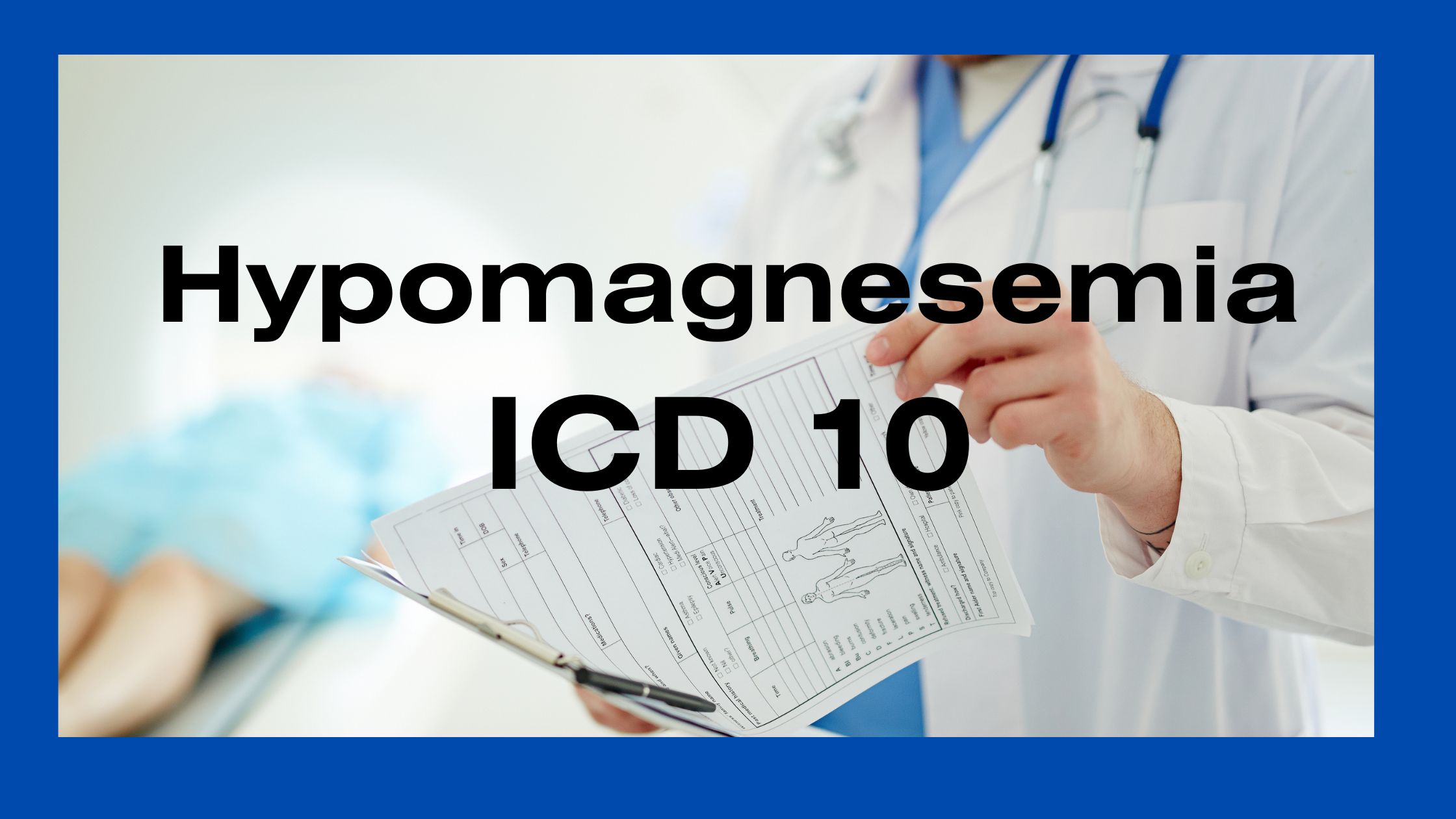Hypomagnesemia, a medical condition with abnormally low levels of magnesium in the blood, is diagnosed and classified using the ICD 10 code E83.42. Magnesium is an essential mineral that plays a crucial role in numerous biological processes within the body, including muscle and nerve function, blood pressure regulation, and protein synthesis. When magnesium levels drop below the normal range, it can lead to various health complications. In this article, we will explore the causes, symptoms, and treatment options for hypomagnesemia, as well as its implications for overall health.
List of Related Hypomagnesemia ICD 10 Codes:
- E83.19 – Other Disorders of Iron Metabolism: This code is used to classify disorders that are related to iron metabolism but do not fall into more specific categories. These disorders could include various conditions affecting the absorption, transport, or utilization of iron in the body.
- E83.2 – Disorders of Zinc Metabolism: This code encompasses disorders involving the metabolism of zinc. Zinc is an essential mineral involved in various physiological processes, and disruptions in its metabolism can lead to health issues.
- E83.3 – Disorders of Phosphorus Metabolism and Phosphatases: This category covers disorders related to the metabolism of phosphorus and enzymes known as phosphatases. These disorders can affect the body’s ability to regulate phosphorus levels, which is crucial for bone and energy metabolism.
- E83.30 – Disorder of Phosphorus Metabolism, Unspecified: This code is used when the specific disorder affecting phosphorus metabolism is not specified or further classified.
- E83.31 – Familial Hypophosphatemia: Familial hypophosphatemia is a genetic disorder characterized by low levels of phosphate in the blood, leading to skeletal and dental abnormalities.
- E83.32 – Hereditary Vitamin D-Dependent Rickets (Type 1) (Type 2): This code is for hereditary forms of rickets that are dependent on vitamin D. Type 1 and Type 2 refer to different genetic mutations causing the condition.
- E83.39 – Other Disorders of Phosphorus Metabolism: This code is used for disorders related to phosphorus metabolism that do not fit into the more specific categories listed above.
- E83.4 – Disorders of Magnesium Metabolism: This category includes disorders affecting the metabolism of magnesium, an essential mineral involved in various biochemical processes in the body.
- E83.40 – Unspecified Disorder of Magnesium Metabolism: When the specific disorder affecting magnesium metabolism is not specified or further classified, this code is used.
- E83.41 – Hypermagnesemia: Hypermagnesemia is a condition characterized by abnormally high levels of magnesium in the blood, which can lead to various health issues.
- E83.42 – Hypomagnesemia: Hypomagnesemia is the opposite of hypermagnesemia and refers to abnormally low levels of magnesium in the blood, which can also have adverse health effects.
- E83.49 – Other Disorders of Magnesium Metabolism: This code covers disorders related to magnesium metabolism that are not specifically categorized elsewhere.
- E83.5 – Disorders of Calcium Metabolism: Disorders of calcium metabolism encompass conditions affecting the body’s ability to regulate calcium levels, which are crucial for bone health, nerve function, and more.
- E83.50 – Unspecified Disorder of Calcium Metabolism: This code is used when the specific disorder affecting calcium metabolism is not specified.
- E83.51 – Hypocalcemia: Hypocalcemia is a condition characterized by low levels of calcium in the blood, which can lead to muscle cramps, seizures, and other symptoms.
- E83.52 – Hypercalcemia: Hypercalcemia refers to abnormally high levels of calcium in the blood and can result from various underlying conditions.
- E83.59 – Other Disorders of Calcium Metabolism: This code is for disorders related to calcium metabolism that do not fit into more specific categories.
- E83.8 – Other Disorders of Mineral Metabolism: This category includes disorders of mineral metabolism that do not fall into the previously mentioned categories.
- E83.81 – Hungry Bone Syndrome: Hungry bone syndrome is a condition that can occur after parathyroid surgery, where the bones rapidly take up calcium, resulting in severe hypocalcemia.
- E83.89 – Other Disorders of Mineral Metabolism: This code covers other disorders related to mineral metabolism that are not specified elsewhere.
- E83.9 – Disorder of Mineral Metabolism, Unspecified: When the specific mineral metabolism disorder is not clearly defined or classified, this code is used.
Causes of Hypomagnesemia:
1. Inadequate Dietary Intake:
One of the primary causes of hypomagnesemia is a lack of magnesium in the diet. Magnesium-rich foods include leafy green vegetables (such as spinach and kale), nuts (like almonds and cashews), seeds (such as pumpkin and sunflower seeds), whole grains (like brown rice and quinoa), and legumes (such as beans and lentils). People who consume a diet low in these sources of magnesium may be at a higher risk of developing hypomagnesemia. It is important to incorporate these foods into your daily meals to ensure an adequate magnesium intake.
2. Gastrointestinal Disorders:
Certain gastrointestinal disorders can affect the absorption of magnesium in the body. Conditions like Crohn’s disease, celiac disease, and chronic diarrhea can lead to malabsorption of magnesium, contributing to hypomagnesemia. In these cases, the damaged or inflamed intestines may have difficulty absorbing nutrients, including magnesium. It is essential for individuals with gastrointestinal disorders to work closely with their healthcare provider or a registered dietitian to determine appropriate dietary modifications or potential supplementation to address magnesium deficiency.
3. Alcoholism:
Excessive alcohol consumption can interfere with magnesium absorption and increase its excretion through the kidneys. Chronic alcoholism is often associated with hypomagnesemia due to both inadequate dietary intake and impaired absorption. Alcohol can affect the absorption and availability of magnesium in the intestines, leading to decreased magnesium levels in the body. It is crucial for individuals with alcoholism to seek professional help and reduce or eliminate alcohol consumption to improve magnesium status and overall health.
4. Medications:
Some medications can cause magnesium depletion as a side effect. These may include diuretics (water pills), certain antibiotics (such as gentamicin and amphotericin B), proton pump inhibitors (used to reduce stomach acid production), and chemotherapeutic drugs. It is important to be aware of the potential magnesium-lowering effects of these medications and discuss any concerns with your healthcare provider. They may recommend monitoring magnesium levels periodically or adjusting medication dosage or regimen if necessary.
Symptoms of Hypomagnesemia:
The symptoms of hypomagnesemia can vary in severity depending on the level of magnesium deficiency. Common symptoms include:
1. Muscle Weakness and Cramps:
Low magnesium levels can lead to muscular weakness and cramps. You may experience twitching, tremors, or muscle contractions, particularly in the legs and feet. Adequate magnesium is necessary for proper muscle function and relaxation. When magnesium levels are low, muscles may not function optimally, leading to weakness and cramps. It is essential to address magnesium deficiency to alleviate these symptoms.
2. Fatigue and Weakness:
Hypomagnesemia can cause general fatigue, weakness, and a lack of energy. Magnesium plays a crucial role in energy production within the body. Insufficient magnesium levels can impair the production of adenosine triphosphate (ATP), the body’s main source of energy. This can result in feelings of fatigue and weakness. Ensuring adequate magnesium intake can help restore energy levels and combat fatigue.
3. Irregular Heartbeat:
Magnesium plays a vital role in maintaining a healthy heart rhythm. Inadequate levels of magnesium can lead to arrhythmias, palpitations, or an irregular heartbeat. Magnesium helps regulate the electrical signals that control heart contraction and relaxation. A deficiency in magnesium can disrupt these signals, leading to irregular heartbeats. It is important to address magnesium deficiency to support heart health and prevent potential complications.
4. Nausea and Vomiting:
Some individuals with hypomagnesemia may experience gastrointestinal symptoms such as nausea, vomiting, and loss of appetite. Magnesium deficiency can affect the smooth muscle function in the gastrointestinal tract, leading to digestive disturbances. These symptoms can further contribute to inadequate magnesium absorption and exacerbate the deficiency. Adequate magnesium intake and addressing the underlying cause are important for managing these gastrointestinal symptoms.
5. Numbness and Tingling:
Numbness, tingling, or a sensation of pins and needles in the hands, feet, or face can occur due to magnesium deficiency. Magnesium is involved in nerve function and nerve impulse transmission. Insufficient magnesium levels can disrupt nerve signaling, resulting in abnormal sensations like numbness and tingling. Restoring magnesium levels can help alleviate these symptoms and support proper nerve function.
Treatment Options for Hypomagnesemia:
The treatment for hypomagnesemia aims to restore magnesium levels to normal. This can be achieved through various approaches, including:
1. Magnesium Supplements:
Supplementing with oral magnesium is a common treatment option for hypomagnesemia. Your healthcare provider may prescribe magnesium supplements in the form of tablets or capsules. It is important to follow the recommended dosage and guidelines for supplementation. Magnesium supplements are available in different forms, such as magnesium citrate, magnesium oxide, or magnesium glycinate. Your healthcare provider can determine the most appropriate form and dosage based on your individual needs.
2. Intravenous Magnesium:
In severe cases of hypomagnesemia or when oral supplementation is not possible, magnesium may be administered intravenously. This allows for a rapid increase in magnesium levels, particularly in emergency situations. Intravenous magnesium administration is typically performed in a hospital or clinical setting under the supervision of healthcare professionals.
3. Dietary Modifications:
Increasing the intake of magnesium-rich foods can help prevent and manage hypomagnesemia. Including foods like spinach, almonds, cashews, and whole grains in your diet can help replenish magnesium levels naturally. A balanced diet that incorporates a variety of fruits, vegetables, whole grains, and legumes is essential for maintaining optimal magnesium levels. It is important to work with a registered dietitian or healthcare provider to develop a personalized dietary plan that addresses magnesium deficiency.
Preventing Hypomagnesemia:
Prevention is key when it comes to hypomagnesemia. Here are a few preventive measures to consider:
1. Balanced Diet:
Maintaining a balanced diet that includes magnesium-rich foods is essential. Incorporating a variety of fruits, vegetables, whole grains, and legumes can help ensure an adequate magnesium intake. It is important to prioritize consuming foods that are natural sources of magnesium and limit the consumption of processed foods that may be low in magnesium.
2. Limit Alcohol Consumption:
If you consume alcohol, it is important to do so in moderation. Excessive alcohol intake can deplete magnesium levels over time. Alcohol interferes with magnesium absorption and increases its excretion through the kidneys. Limiting alcohol consumption or seeking professional help for alcoholism can help prevent magnesium deficiency and its associated health complications.
3. Be Aware of Medications:
If you are taking medications known to affect magnesium levels, it is crucial to discuss this with your healthcare provider. They may recommend monitoring magnesium levels or adjusting your medication regimen if necessary. It is important to understand the potential side effects of medications and their impact on magnesium status. Open communication with your healthcare provider is essential for optimizing treatment outcomes and maintaining adequate magnesium levels.
Conclusion:
Hypomagnesemia, indicated by the ICD 10 code E83.42, is a condition characterized by low magnesium levels in the blood. It can be caused by inadequate dietary intake, gastrointestinal disorders, alcoholism, or certain medications. Recognizing the symptoms, seeking proper diagnosis, and implementing appropriate treatment options are vital for managing hypomagnesemia effectively. By adopting a balanced diet that includes magnesium-rich foods, avoiding excessive alcohol consumption, and being aware of medication side effects, individuals can help prevent the development of hypomagnesemia and maintain optimal magnesium levels for overall health and well-being. It is important to consult with healthcare professionals for personalized guidance and treatment.
FAQ :
Ans. Hypomagnesemia is a medical condition characterized by abnormally low levels of magnesium in the blood.
Ans. The common causes of hypomagnesemia include inadequate dietary intake, gastrointestinal disorders, alcoholism, and certain medications.
Ans. The symptoms of hypomagnesemia include muscle weakness and cramps, fatigue and weakness, irregular heartbeat, nausea and vomiting, and numbness and tingling.
Ans. The treatment options for hypomagnesemia include magnesium supplements, intravenous magnesium administration, and dietary modifications


